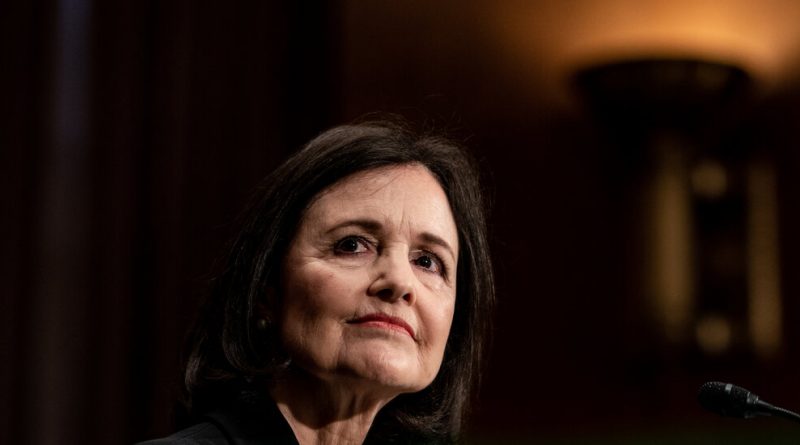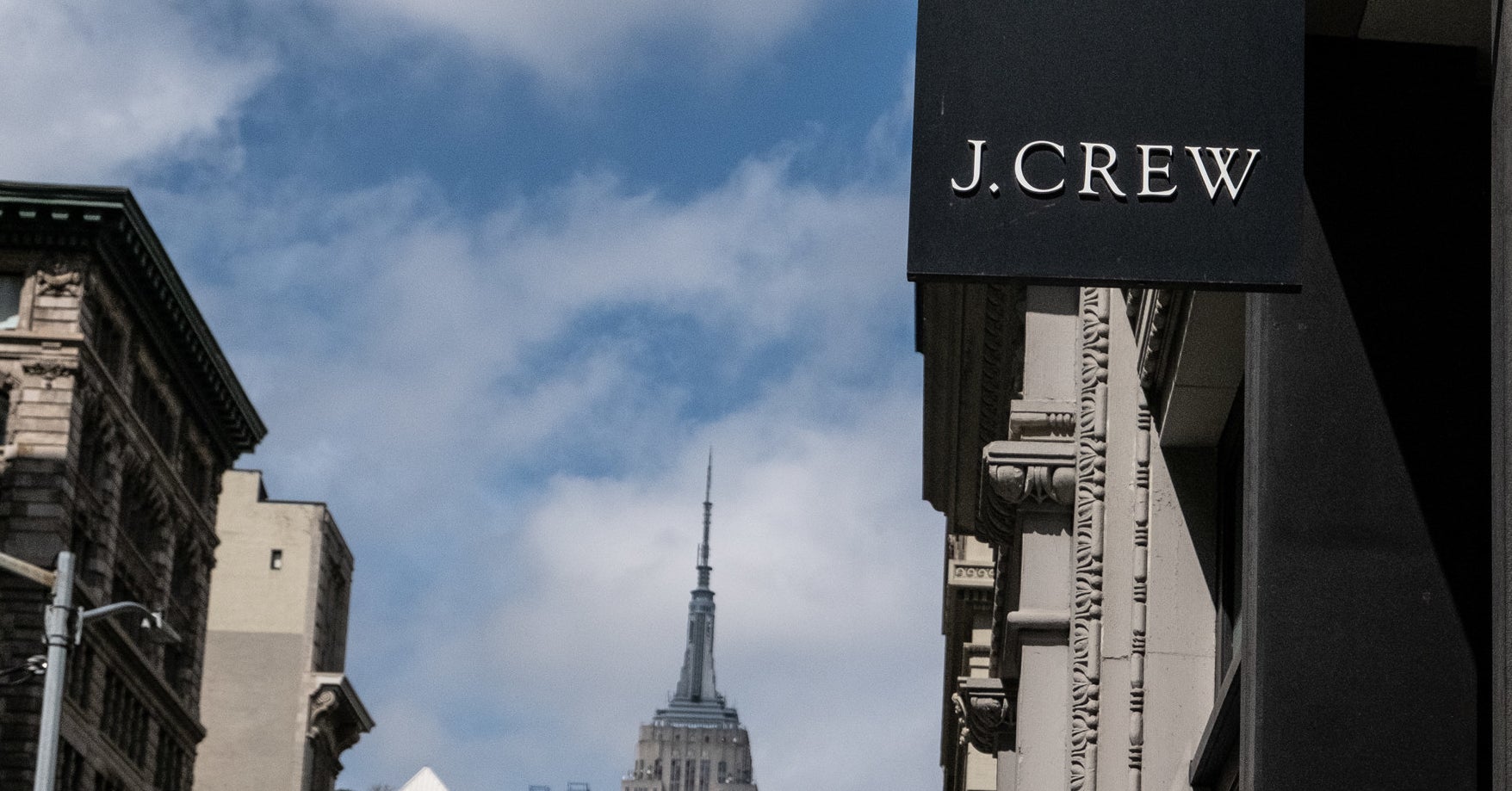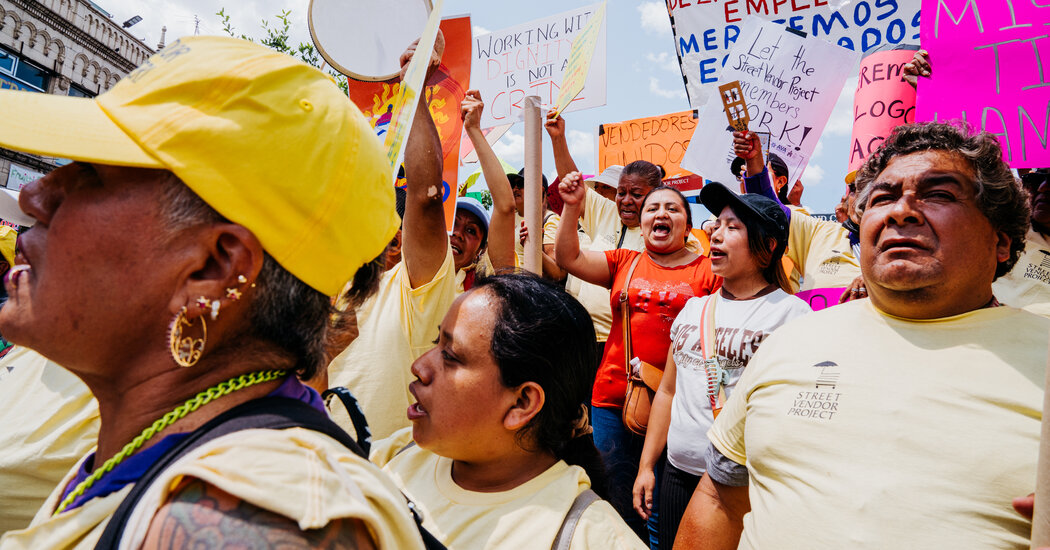S&P 500 Falls After Vaccine-Fueled Charge: Live Market Updates
Here’s what you need to know:

The nomination of Judy Shelton to fill one of two remaining open seats on the Federal Reserve’s Board of Governors failed to advance to a final vote on Tuesday afternoon.
While 47 senators voted to limit debate on Ms. Shelton’s nomination — a procedural step necessary to move it along toward a confirmation vote — 50 senators voted against the motion.
Ms. Shelton’s nomination could still be resuscitated. Mitch McConnell, the Republican Senate majority leader, took steps on Tuesday afternoon that will allow him to bring up the nomination again. Still, the decision afternoon marks a significant setback to a Fed nomination that has been plagued by ups and downs. Ms. Shelton was nominated 16 months ago, but has been repeatedly delayed by lawmaker skepticism over her views.
While it looked like she was finally on the brink of confirmation, the coronavirus complicated Republican’s last-minute attempt to place Ms. Shelton — a loyal fan of President Trump’s and a long time proponent of some sort of gold standard — in a role at the nerve center of the American economy.
Democrats uniformly opposed moving Ms. Shelton’s nomination to the final stage, and two Republican senators — Mitt Romney and Susan Collins — voted “no.” While Senator Lamar Alexander, Republican of Tennessee, also announced his opposition to Ms. Shelton’s nomination, he was not present for the vote because of what a spokesman said were family matters. Two senators, Senator Charles E. Grassley of Iowa and Senator Rick Scott of Florida, were in quarantine.
That deprived Ms. Shelton of the votes she needed to move on to a final approval that could have secured her a spot on the Fed’s powerful Board of Governors.
If she were to be confirmed, Ms. Shelton, 66, would take one of seven seats on the central bank’s Washington-based board. With her addition, five of the six filled seats will contain Mr. Trump’s appointees. The president has nominated Christopher Waller, a Federal Reserve Bank of St. Louis research official, to fill the remaining open seat. It is unclear when his less contested nomination could come to a vote.
Senators are rushing Ms. Shelton’s nomination through in a brief window before Mark Kelly, the Democratic Senator-elect from Arizona, can be seated at the end of the month. Her offbeat views and loyalty to the White House have stirred concern among even some key Republicans, leaving her such a narrow margin of support that flipping that one seat could cost her chances of confirmation.
Ms. Shelton has long favored backing the U.S. currency with gold or some other peg, which would undermine the very function of the Fed. She advised the Mr. Trump’s 2016 campaign, and while Fed appointees often have political pasts, she has written glowing articles praising Mr. Trump and has at times appeared to question the value of central bank independence. She once favored higher interest rates, but abruptly changed that position to mirror Mr. Trump’s preference for low interest rates once she was in the running for a nomination to the Fed.
Joseph R. Biden Jr.’s election victory may have helped Ms. Shelton’s chances. Installing Republican nominees at the Fed before the new administration takes office will curb Mr. Biden’s ability to appoint his own central bank picks. Governors have 14-year terms, but Ms. Shelton is filling an unexpired seat and would need to be reappointed in 2024.
Jerome H. Powell, the chair of the Federal Reserve, said surging coronavirus cases pose a major risk to the United States economic outlook, and that while progress toward a vaccine is good news for the medium-term, it is too soon to account for it with any confidence.
“Even in the best case, widespread vaccination is months in the future,” Mr. Powell said, noting that there is a risk that “people will lose confidence” and pull back from economic activity in the near-term as the virus spreads and they try to avoid infection.
“It’s probably too soon to say with any confidence” what the economic impact of potential vaccines might be, Mr. Powell said. Two pharmaceutical companies, Pfizer and Moderna, have announced positive trial results in recent days. The Fed chair underlined that many uncertainties surrounding timing, manufacturing and distribution remain.
Mr. Powell also warned that the ongoing economic fallout caused by the pandemic could scar the economy, both by inflicting lasting damage on worker résumés and by pushing companies out of business. He warned that women in particular may face career damage as they leave the work force in big numbers.
“From the very start, we’ve been concerned about longer-run damage to the productive capacity of the economy,” Mr. Powell said. “We’ve got a long way to go.”
Service workers may need more support as they reshuffle into new types of jobs, he said. Mr. Powell and his colleagues have repeatedly suggested that Congress might need to provide additional aid to workers and companies, as key pandemic relief programs have expired and left families and businesses without much of an ongoing backstop.
“We’re not going back to the same economy,” he said, adding that the Fed, for its part, will continue to support the economy “for as long as it takes, until the job is well and truly done.”
The central bank has cut rates to near-zero, bought huge quantities of government-backed debt, and offered emergency loans in a bid to shore up the economy in the face of the pandemic. Those programs cannot directly get money into hands of those who have lost jobs and customers, but by making credit cheaper, they can help to fuel economic activity overall.
Mr. Powell signaled that he favors keeping the Fed’s emergency lending programs, many of which will need to be extended to continue past Dec. 31, in place. There are questions about whether the Treasury Department, which needs to sign off on the extension, will support continuing the full suite of programs, which include efforts to help state and local governments and mid-sized businesses.
“When the right time comes — and I don’t think that time is yet or very soon — we’ll put those tools away,” Mr. Powell said of the emergency lending programs on Tuesday.

Tesla will join the S&P 500 next month, earning a mark of corporate maturity that may only add to the remarkable rise in its stock price.
Inclusion in a major index typically sets off a scramble among investors to buy the shares of the newly added company, because many investment funds are designed to mirror the index exactly.
And the S&P 500 is one of the most widely followed measures of the performance of the American stock market, with more than $11 trillion worth of mutual funds and other investments measured against the index. That includes more than $4.5 trillion in index fund investments.
Tesla’s shares rose 8.2 percent on Tuesday, following news of its inclusion in the index, and are up more than 400 percent this year.
In order to stay aligned with the S&P 500 when Tesla is officially added before the market opens on Dec. 21, JPMorgan Chase analysts estimate that such indexers will need to buy roughly $34 billion worth of Tesla shares.
But Tesla’s large size also could stimulate a sell-off in the index’s other stocks, according to analysts at Bespoke Investment Group, because the index funds will need to sell some of the other stocks in the benchmark.
Previous large additions to the index — such as the inclusion of Berkshire Hathaway in February 2010 — coincided with a sell-off in the over all index, the analysts said.
With a market capitalization of about $390 billion — on par with Johnson & Johnson — Tesla will immediately become one of the largest companies in the index. It’s unusual for a company to be so large when it earns inclusion in the index, but the company’s failure to steadily produce profits had until recently made it ineligible. To be included in the S&P 500, a company must report positive fully audited profits in the four most recent quarters, a financial feat Tesla has only accomplished this year.
Tesla’s sheer size will give it immediate influence over the S&P 500, which is weighted by market capitalization. If shares of the electric carmaker continue their remarkable rise, it will help push the S&P 500 higher. Of course, it is also true that a slide in Tesla’s volatile shares will hurt the index.

The drug maker Pfizer says it will work with four states — Rhode Island, Texas, New Mexico, and Tennessee — to refine their plans for delivering and administering its Covid-19 vaccine before the vaccine receives its expected authorization. The step reflects the complexity of distributing on a large scale a vaccine that requires ultracold storage.
The pilot program, which the company announced on Monday, is aimed at helping the states with their planning, but it will not mean that they receive doses of the vaccine any earlier than other states do. The four participants were chosen to represent states of different sizes, populations, and existing capacities for delivering vaccines against other viruses, the statement said.
“We are hopeful that results from this vaccine delivery pilot will serve as the model for other U.S. states and international governments,” Angela Hwang, a Pfizer executive, said in a statement.
Pfizer, which announced last week that an early analysis had found its vaccine to be more than 90 percent effective, expects to collect the final safety data this week that it needs to submit its results to the Food and Drug Administration. Another developer, Moderna, announced on Monday that its vaccine candidate appeared to be 94.5 percent effective in an early analysis.
Both vaccines use what is known as messenger RNA technology, but their cold storage requirements are different. Pfizer’s vaccine must be kept much colder, at around minus 70 degrees Celsius, for long-term storage, though it can be kept for short periods in a conventional freezer or a cooler. That ultracold storage requirement could hinder its distribution, particularly in rural areas.
Moderna’s vaccine, on the other hand, can be kept for up to a month at 2 to 8 degrees Celsius (about 36 to 46 degrees Fahrenheit), the temperature of an ordinary refrigerator, the company said on Monday.

The longest-serving late-night host is leaving late night.
“Conan,” the TBS show hosted by Conan O’Brien, will go off the air in June, and the host will move on to HBO Max, where he plans to have his own weekly variety series, Warner Media announced on Tuesday.
“In 1993 Johnny Carson gave me the best advice of my career: ‘As soon as possible, get to a streaming platform,’” Mr. O’Brien said in a statement. “I’m thrilled that I get to continue doing whatever the hell it is I do on HBO Max, and I look forward to a free subscription.”
It is something of a lateral move: TBS and HBO Max are both part of WarnerMedia, AT&T’s news and entertainment division.
Mr. O’Brien’s nightly show got a revamp last year, when it was pared down from an hour to 30 minutes, with a focus on a single guest. The change did not keep it from getting lost in the shuffle of a crowded late-night field. For the week of Nov. 9, when Mr. O’Brien welcomed John C. Reilly, Zach Braff and Laci Mosley as guests, “Conan” averaged 275,000 viewers, according to Nielsen. That total was dwarfed by the 700,000 viewers for Trevor Noah’s “The Daily Show” on Comedy Central and the 2.6 million who tuned in for Stephen Colbert’s “The Late Show” on CBS that week. Unlike the majority of his competitors, Mr. O’Brien has not made pointed political humor the focus of his nightly monologues, favoring a more absurdist approach.
By the time he concludes his “Conan” run, Mr. O’Brien — a onetime writer for “The Simpsons” and “Saturday Night Live” who went before the cameras as the surprise successor to David Letterman on NBC’s “Late Night” in 1993 — will have put in 28 consecutive years as a late-night host. (Mr. Letterman made it to 33 consecutive years.) “Conan” debuted on TBS in 2010, not long after Mr. O’Brien’s ill-fated run as the host of NBC’s late-night franchise, “The Tonight Show.”
In recent years, Mr. O’Brien has expanded his output, with a popular podcast — “Conan O’Brien Needs a Friend” — and a travel series, “Conan Without Borders.” New episodes of the travel show will continue to air on TBS, the company said.

Even as the broader economy weakened and federal stimulus money ran out, Americans continued to stock up on food and buy new and used cars, and that’s meant retail sales have held up better during the pandemic than just about anyone expected.
On Tuesday morning, the Commerce Department reported that sales for October rose 0.3 percent, the sixth consecutive month of gains. Sales in September had increased 1.6 percent.
An earlier holiday shopping season, with Black Friday deals beginning many weeks before Thanksgiving, helped drive October’s increase. Amazon also moved its “Prime Day” to October from July, which bolstered sales.
“Even as we enter the fourth month with no additional fiscal stimulus, elevated political uncertainty and unprecedented levels of new Covid-19 cases, American households continued to spend,” Morgan Stanley economists wrote in a research note last week.
Sales continued to be robust in specific categories, with Americans buying groceries and home improvement items. But with many people still working from home, they were spending much less on clothing and gas.
The economists said an improving job market and growing savings rate had enabled Americans to keep spending.
But just as they have every month since retail sales began to rebound in May, economists warned that rising infections and new lockdowns could stall a recovery that seems, at times, to have defied reality.
Also on Tuesday, Walmart reported that its strong sales growth during the pandemic continued in the third quarter. The nation’s largest retailer said that same store sales increased 6.4 percent from a year ago, while e-commerce sales were up 79 percent. Walmart has been making a big bet on its online sales, including curbside pick of groceries at its stores, as more people shy away from shopping in physical stores because of the virus. The company said the shift to online shopping would endure past the pandemic.
“We think these new customer behaviors will largely persist,” the company’s chief executive, Doug McMillion, said in a statement.
-
Stocks were lower Tuesday, falling back after a run that has lifted shares on Wall Street to new highs.
-
The S&P 500 fell about half a percent. The Stoxx Europe 600 and the FTSE 100 in Britain were also lower.
-
Even so, Wall Street is on track for its best month since April. Through Tuesday, the S&P 500 was up more than 10 percent. The most recent gains have been fueled by optimism that an effective vaccine against the coronavirus is within reach, after Moderna and Pfizer each reported that early trials of their vaccine candidates were showing high rates of success.
-
Still, any vaccine is months away from being widely available and coronavirus cases are surging in Europe and the United States, with new measures to contain the pandemic threatening the economic recovery.
-
Share of Tesla jumped more than 8 percent after S&P Dow Jones Indices said it would add the company to the S&P 500. The stock is up more than 400 percent this year.
-
Pharmacy stocks including CVS Health, Rite Aid and Walgreens Boots Alliance were sharply lower after Amazon said it would allow customers to order prescription drugs online. Shares of Amazon rose slightly.
-
EasyJet, the Britain-based discount airline that primarily serves vacation travelers, fell about 2 percent after it reported a loss of 1.27 billion pounds ($1.68 billion) for the year ending in September, the carrier’s first annual loss in its 25-year history.

Two runoff elections in January will decide Georgia’s senators, the Senate majority and potential limits on President-elect Joseph R. Biden’s agenda. Private equity’s preference for the Republican contenders shows up in campaign contributions in races there, Ricardo Valadez of the nonprofit organization Americans for Financial Reform noted in the DealBook newsletter.
Government gridlock protects private equity’s business model, ensuring that major changes proposed by Democrats, like Senator Elizabeth Warren’s Stop Wall Street Looting Act, won’t become law, Mr. Valadez said. Mr. Biden got the most direct contributions associated with private equity in 2020, but Republican Senators Mitch McConnell of Kentucky, John Cornyn of Texas and Susan Collins of Maine were the next-biggest recipients, reflecting the sector’s preference for divided government.
In Georgia, donations linked to people at Apollo and KKR were in the top 10 contributions for the Republican incumbent David Perdue. His Democratic challenger, Jon Ossoff, appears to have no private equity ties among top donors. The dynamic is less skewed in the other Senate race, where contributions linked to Blackstone and Roark Capital were among the top donations to the Republican incumbent Kelly Loeffler, who previously worked on Wall Street. Her Democratic challenger, the Rev. Raphael Warnock, counts donors from Insight Partners among his top five givers.
A lucrative tax break is at stake, said Eileen Appelbaum, the co-director of the nonprofit group Center for Economic and Policy Research. With Senate control, Democrats could eliminate the favorable tax treatment of carried interest, which would put a big dent in private equity executives’ earnings, she said. Although President Trump has denounced the carried interest loophole, lobbying helped fend off any changes. A Republican-controlled Senate is likely to continue to resist altering the treatment of investment gains.
-
Mars, the company behind M&M’s and Snickers, is acquiring the company that makes Kind bars, the snacks that celebrate their lack of artificial flavors and preservatives, company executives told The New York Times in an interview. The deal for Kind North America comes three years after Mars, a privately held giant in the candy industry, took a minority stake in the company. The purchase was confirmed by company executives. Terms were not formally announced, but people with knowledge of the deal said it valued Kind at about $5 billion.
-
The beleaguered Chinese tech giant Huawei said on Tuesday that it would sell its budget smartphone brand, Honor, to a Chinese state-owned entity, in a sign of the strain the company is under as the Trump administration’s restrictions on its business start to bite. Huawei did not disclose the size of the sale. The company said that once the transaction was complete, it would not hold any shares in the new Honor business or be involved in its management.
-
Airbnb revealed declining revenue and growing losses in a prospectus for an initial public offering on Monday, The New York Times’s Erin Griffith reports. In total, Airbnb brought in $2.5 billion in revenue in the first nine months of the year, down from $3.7 billion a year earlier. The offering, which could value Airbnb at more than $30 billion and raise as much as $3 billion, will test investors’ appetite for hospitality-related stocks in a year when the industry has been battered and its future is uncertain.
Sahred From Source link Business



